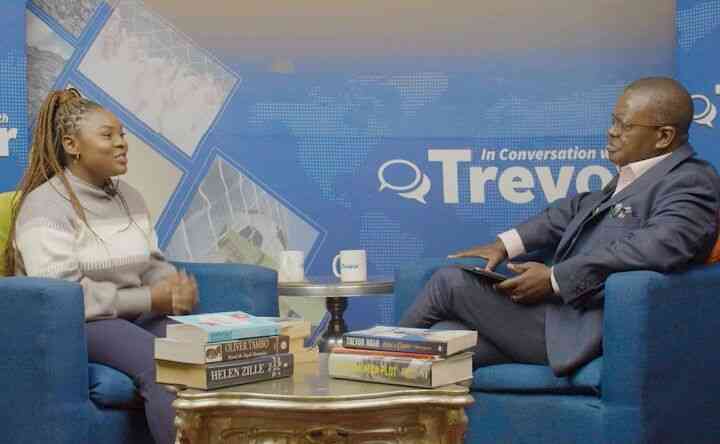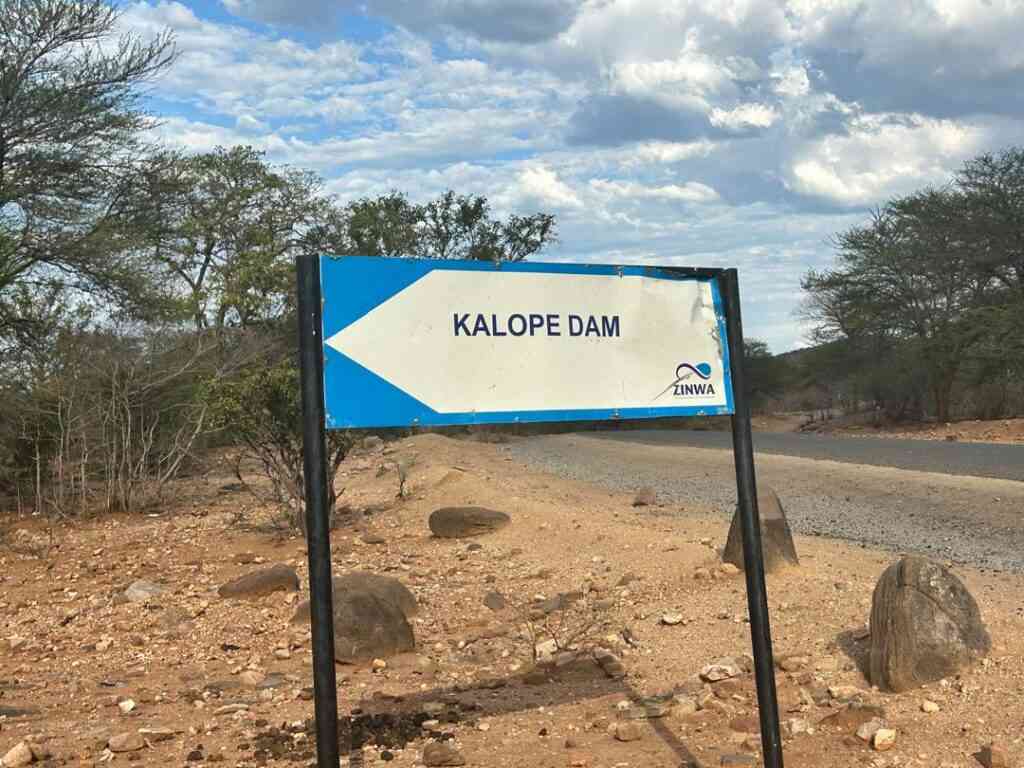
Rumbidzai Chingosho, a battery operations engineer at Mobility Africa, says she managed to get her dream job because she always wanted to be “playing with robots.”
Chingosho (RC) shared her career journey on the platform In Conversation with Trevor hosted by Alpha Media Holdings chairman Trevor Ncube (TN).
Below are excerpts from the interview.
TN: Rumbidzai Chingosho, welcome to In Conversation with Trevor.
RC: Thank you so much Trevor. I'm so excited to be here.
TN: I'm very excited to have you here. We have been meeting in a number of places and a number of people have been saying ‘You must talk to Rumbidzai.
- Chamisa under fire over US$120K donation
- Mavhunga puts DeMbare into Chibuku quarterfinals
- Pension funds bet on Cabora Bassa oilfields
- Councils defy govt fire tender directive
Keep Reading
RC: I'm delighted.
TN: Rumbidzai you say to me that somebody said you should buy this book, a book by Victor Franklin Men’s Search for Meaning.
Why did your friend say you should buy this book? I would love you to share the story with our viewers.
RC: So one of my friends said he wanted to actually buy me something for my birthday and we happened to be at Sam Levy and then I showed him the bookstore and I was like ‘this is my favourite bookstore.’
I was like since you are here and you have been complaining for months, I think I have a book I would like you to read and then he was like let's buy Men’s Search for Meaning.
I was like ‘he also wants to read it so I'm just going to give it to you so that you can read it and be grateful about your life and then as soon as you are done you give it back to me.’ I was really excited.
I have read the book. It ranks as one of the most life changing books I have ever read. It’s a small book, but it's powerful.
TN: So what have you been complaining about Rumbidzai? You are a high flyer by the way.
You are here for us representing those people that we see so much promise.
We see you as somebody that people out there ought to watch out for. What have you been complaining about?
RC: Well, I think it's just part of growing up. I think you know growing up I always thought that maybe life is a bit structured, but then now that I'm growing up, I'm within this world.
I’m starting to realise that it's not. I think I wasn't prepared for a lot of these things, and I'm growing, I am learning.
It’s just that I have been complaining. If something doesn't go the way I expected it to, then I complain.
A friend was like ‘there is a lot that is going on with you, be grateful for what you have and stop complaining.’
I even pray about it sometimes. I'm like ‘God I'm complaining too much, I'm really sorry but I'm struggling with this at the current moment.
Can you please help me. I don't want to complain.
So he said ‘please read this book and try to be more grateful with everything that's happening in your life. So I'm really grateful for the book.
TN: Wonderful. It's a great book for you.
You'll enjoy it and it will make you realise that you have got to be grateful. So right now have you realised that there are certain things you must be grateful about?
RC: Yes.
TN: What are you grateful for?
RC: I just graduated last year and I have noticed how hard it is to get a job in Zimbabwe and I have so many friends that don't have jobs and my siblings don't even have jobs and the fact that I actually have this job is something I am massively grateful for.
TN: So what are you complaining about?
RC: It's just a part of me that feels like I can do better.
So a part of me every time I'm at work or I'm doing something, I feel like I can do better than this. So a part of me wants to do better. I’m a young girl, you know.
TN: It's a good place to be in, to do better, to be careful not to miss the moment of where you are and be grateful for what you have but continue to push yourself, isn't it.
So you passed your BSC Mechanical Engineering with a 2.1 and you said you could have had a first class?
RC: Yes, I could have. I think I got a bit relaxed during my final year. I was also working. I was trying to balance both and I think I struggled a bit with my final year.
I lost so much confidence. They were asking me ‘what are you guys doing?, why are you doing this?
Why don't you do it the other way? They made me feel like I could have done better.
TN: So you had been interning with Mobility for Africa for three years?
RC: Yes. I was an intern the first year from 2021. I got an assistant position to the CTO in 2022 to 2023 and then chief technology officer assistant to the chief technology officer.
TN: And you are going around complaining, seriously?
RC: I'm sorry if I sound ungrateful. I'm very grateful.
And then recently this year, I got a more junior management position as a battery operations engineer.
TN: So you say you have had problems explaining to people what Mobility for Africa is. Can you explain to us now what Mobility for Africa is?
RC: Okay so Mobility for Africa is a technology oriented company.
We are providing mobility as well as energy to small scale rural farmers, mainly women.
So we are now operating in about five places in Zimbabwe that is Wedza, Chipinge, (Watsomba Hauna) Honde Valley, Domboshava.
So we provide electric vehicles. They are three-wheelers. They actually use lithium iron batteries for energy storage. That’s basically the engine.
We have been providing them to various women in different rural communities. They are using it for less mobility.
We call it less mobility like I can get a bus from here to like where I come from in Marondera, but I don't have a mode of transportation for me and my gogo, yeah from our garden to go to the market to sell our things.
We don't have a mode of transportation for my gogo to do like basic day to day stuff.
So we are providing a mode of transportation for that and we are also planning to be using our batteries for our power tools like a drill in the community if someone wants to rent a drill you can always come and take out battery.
We are also developing what we call sort of like mini grids. We call them charging stations.
They are like portable energy storage systems. If you have ever heard about power walls, something similar to that, so basically its Mobility for Africa.
TN: Wow. Talk to us about what you are actually doing. What does a battery operations engineer do? What do you do?.
RC: Let me actually explain how I got into that.
TN: Sure, that's a good way to start!
RC: So when I got to the company, it was still a bit small and my role there was just to help with General operations, if something needs to be done I'm your person.
And then in 2021, 2022 as they would call it a spanner lady, in 2022 we received our first shipment from our technology partner in China of batteries and there was no one who really understood the technology more than the people, who designed them.
So we started having sort of issues with the battery technology.
We kind of needed someone to be a focal point to go through those issues and I loved it.
I wanted to do it so I didn't know much.
Like ‘I am an engineering student, I know the basics of physics, I know the basics of everything, but when it goes deep down I don't understand. But I wanted to learn.
It was so interesting technology because I feel like doing engineering in Zimbabwe is, ‘I'm sorry to say this is a bit theoretical.’
It's not what I wanted when I went to university Trevor.
I wanted to be playing with robots and stuff and I didn't exactly get that so I think when I got to Mobility for Africa and I could play with stuff, I could bend stuff.
I was like this is where I want to be.
So I started experimenting and learning and one of my superiors noticed that I actually enjoy doing this.
She gave me a platform for me to grow and learn.
She is very proactive in trying to help me understand the technology from a design perspective so we had a couple of engineers from China from our technology partner, who came to sort of teach me and a couple of guys and all the team to understand the batteries, the technology and how we can actually do it.
TN: These are lithium batteries okay?
RC: Exactly. We call the batteries management system.
So we started having issues with that. It’s electronics basically. We started having issues with that, so I kind of took it upon myself that I want to be the focal point when it comes to batteries.
So the more the company grew, they kind of put me in charge of the batteries and I'm excited. I love it.
I'm learning a lot about battery operations. I swear to God, I love it.
TN: You basically raised your hand you said ‘I want to do this; I want to do this, you don't need to hire someone. I'm here and you are doing it and you are enjoying it?
RC: I'm enjoying it. I'm at my happiest when I'm playing with the battery technology rather than when I'm telling other people what to do.
TN: Tell me, so you studied engineering? Break it down for us. What subjects were you doing?
RC: The first semester you are basically doing drawing. You're learning how to draw basically and using software for drawing auto cards.
We also did a bit of programming. We did the basics to electrical systems.
The second year you are divided into your specific groups. For us we would do mechanics.
We did a bit of power plants. We also had the opportunity to do renewable energy, which is most of what I actually ended up doing at the end of the day.
It's a very complicated course. It’s one of the toughest.
But at the end of the day, I ended up going towards the renewable energy side and I ended up taking a bit more of electrical courses than I was supposed to because I feel like I ended up doing mechanical engineering because it was the broadest.
I thought I wasn't sure what I wanted to do. So I thought if I do mechanical, it seems so broad, I could be touching various things and maybe at the end of the day I will figure out what I want to do.
So now that I went to Mobility for Africa, while I was still starting I realised that I think I need to go into the electrical side now because it's more interesting.











